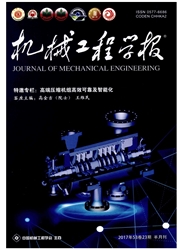

 中文摘要:
中文摘要:
针对电热致动器在交流电作用下承受交变温度载荷而发生热疲劳失效的现象,分析热疲劳失效机理。建立电热致动器的瞬态温度分析模型和力学模型,实测致动位移,实测位移与理论计算、有限元仿真结果一致。温度和应力计算表明,结构形式和施加的电压直接影响致动器的温度分布和应力大小,因最大应力小于屈服强度极限而不会发生应力引起的疲劳失效。测试交流电作用下致动位移和循环次数的关系,试验结果和理论计算表明,温度低于脆性-韧性转换温度,电热致动器不发生热疲劳失效,否则在长期循环后会发生热疲劳失效。300~600℃的温度对电热致动器的工作最有利,在此温度范围内能够精确稳定地提供数千万次的致动循环。根据失效现象,分析热疲劳失效机理,得出高温变形是引发热疲劳失效的直接原因,交流电压的幅值和频率对热疲劳的作用都能统一到温度上。
 英文摘要:
英文摘要:
To counter the thermal fatigue failure of electrothermal actuator caused by the alternating temperature loading due to alternating current (AC), the failure mechanisms of the thermal fatigue failure is analyzed. The transient temperature analysis model and the mechanical model of the actuator are developed. The output displacement of actuator is measured and the experimental results are in good agreement with the theoretical predictions and finite element analysis. The relationships between temperature and the frequency or amplitude of the AC are analyzed. The results show that the structure and the applied voltage levels have significant influence on the temperature distributions and the value of the stress and the stress is not the dominant thermal fatigue failure mechanism for the maximum stress below the yield stress of the material. The relationships between displacement and number of cycles of the electrothermal actuator with AC loading are tested, it is indicated that the thermal fatigue failure won’t take place when electrothermal actuator working below ductile-brittle transition temperature, otherwise, thermal fatigue failure will occur after long-term cyclic loading. It is confirmed that the temperature between 300℃ to 600℃ is comparatively suitable for electrothermal actuator according to theoretical and experimental analysis, and the actuator is able to provide accurate and stable number of cycles for tens of millions. Thermal fatigue failure mechanism of electrothermal actuator is analyzed. The analysis indicates that high temperature deformation is the direct reason for thermal fatigue failure, and the frequency and amplitude of the AC which effect on thermal fatigue can be treated as the effects caused by temperature.
 同期刊论文项目
同期刊论文项目
 同项目期刊论文
同项目期刊论文
 期刊信息
期刊信息
